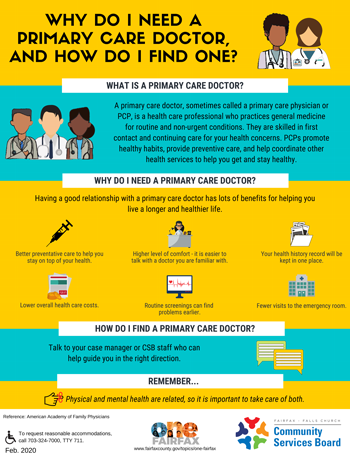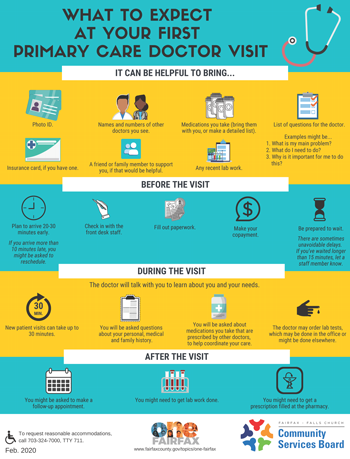This information is also available in Spanish as a printable flyer.
Esta información también está disponible en español como folleto imprimible.
Esta información también está disponible en español como folleto imprimible.
Why do I need a primary care doctor, and how do I find one?

What is a primary care doctor?
A primary care doctor, sometimes called a primary care physician or PCP, is a health care professional who practices general medicine for routine and non-urgent conditions. They are skilled in first contact and continuing care for your health concerns. PCPs promote healthy habits, provide preventive care, and help coordinate other health services to help you get and stay healthy.
Why do I need a primary care doctor?
- Better preventative care to help you stay on top of your health.
- Higher level of comfort - it is easier to talk with a doctor you are familiar with.
- Lower overall health care costs.
- Routine screenings can find problems earlier.
- Your health history record will be kept in one place.
- Fewer visits to the emergency room.
Having a good relationship with a primary care doctor has lots of benefits for helping you live a longer and healthier life.
How do I find a primary care doctor?
- Talk to your case manager or CSB staff who can help guide you in the right direction.
Remember
- Physical and mental health are related, so it is important to take care of both.
Reference: American Academy of Family Physicians
What to expect at your first primary care doctor visit

It can be helpful to bring...
- Photo ID.
- Names and numbers of other doctors you see.
- Medications you take (bring them with you, or make a detailed list).
- Insurance card, if you have one.
- A friend or family member to support you, if that would be helpful.
- Any recent lab work.
- List of questions for the doctor. Examples might be...
- What is my main problem?
- What do I need to do?
- Why is it important for me to do this?
Before the visit
- Plan to arrive 20-30 minutes early. If you arrive more than 10 minutes late, you might be asked to reschedule.
- Check in with the front desk staff.
- Fill out paperwork.
- Make your copayment.
- Be prepared to wait. There are sometimes unavoidable delays. If you've waited longer than 15 minutes, let a staff member know.
During the visit
- The doctor will talk with you to learn about you and your needs.
- New patient visits can take up to 30 minutes.
- You will be asked questions about your personal, medical and family history.
- You will be asked about medications you take that are prescribed by other doctors, to help coordinate your care.
- The doctor may order lab tests, which may be done in the office or might be done elsewhere.

